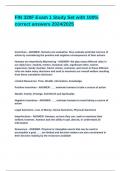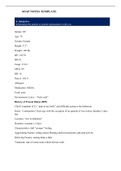FIN 320F Exam 1 Study Set with 100%
correct answers 2024/2025
Incentives - ANSWER- Humans are evaluative: they evaluate potential courses of
action by considering the positive and negative consequences of their actions
Humans are Imperfectly Maximizing - ANSWER- We play many different roles in
our daily lives: student, mentor, husband, wife, significant other, worker,
supervisor, family member, friend, citizen, customer, and more! In these different
roles we make many decisions and seek to maximize our overall welfare resulting
from these cumulative decisions
Limited Resources: Time. Wealth, information, knowledge,
Positive incentives - ANSWER- ___ motivate humans to take a course of action
Wealth, Family, Prestige, Self-Worth and Spirituality
Negative incentives - ANSWER- ___ motivate humans to avoid taking a course of
action
Legal Sanctions. Loss of Money, Social Sanctions, Physical Sanctions
Imperfections - ANSWER- Humans, as best they can, seek to maximize their
welfare; however, humans lack the ability to get, absorb, or understand all
information
Resources - ANSWER- Physical or intangible assets that can be used to
accomplish a goal. ___ are limited and decision makers are also constrained in
their decision making by the resources available
,Resourcefulness - ANSWER- Despite their limits humans operate in creative ways
to expand their set of positive incentives and minimize the impact of negative
incentives
Confirmation Bias - ANSWER- The tendency to process information by looking
for, or interpreting information that is consistent with one's existing beliefs
Economic activity - ANSWER- The production, distribution and consumption of
economic assets
Economic assets - ANSWER- Assets functioning as stores of value and over
which ownership rights are enforced by institutional units, individually or
collectively, and from which economic benefits may be derived by their owners
by holding them, or using them, over a period of time
Property rights - ANSWER- The right to control an asset. This control includes
how the property should be used, how the benefits from this use are distributed,
and the ability to dispose of the asset.
Efficiency - ANSWER- Getting the most output from scarce productive resources
Fairness - ANSWER- The concept that all humans have value and should be
treated equally and with respect. This implies a decent standard of living through
the adequate access to economic assets
Socialism - ANSWER- A governmental system with a collective or governmental
control of property rights.
Capitalism - ANSWER- A market economy where individuals control property
rights, especially the right to control assets used to produce society's economic
assets
Corruption - ANSWER- Dishonest or illegal activity by persons in authority,
especially political leaders, government administrators, judicial officials and
police
Mixed Economy - ANSWER- Most countries do not have purely capitalist or
socialistic societies but rather have a ___ in which government and markets
interact
, Today the U.S. and other major economies are neither pure socialist or pure
market, but rather ___ where private property rights are respected and
businesses have substantial economic freedom to operate, but where
governments do intervene in economic activity in order to achieve social goals.
Three Key Roles of the Government - ANSWER- Enhance the welfare of its
citizens.
- Governments should also provide a framework within which economic activity
can occur, such as effective transportation, communication, and education.
Limit opportunistic behavior.
-Governments are also expected to limit opportunistic behavior in market
transactions. Societies have found that economic activity can be exploited
through monopolies, unsafe products, deceptive marketing, child labor, and
more. While market behavior is constrained by competition and consumer choice,
consumers may lack information on their choices or even the existence of choice
itself.
Modify or Replace Markets
- Governments may actually take on economic activity. Many people believe that
markets may fail, or they think markets may produce bad results that harm
individuals and localities, thus producing unfair results. In these cases, the
government may step in and allocate resources in a fair manner. The entire
debate over health care in the U.S. involves this fundamental issue of fairness.
Given the increasing level of economic inequality, this is a serious issue to
consider.
Ethics - ANSWER- ___ are the norms of behavior that guide human actions, in
effect how humans treat each other
Nonprofit organizations - ANSWER- ___ in the U.S, are groups that are tax-exempt
as "public charities" because they are formed to provide "public benefit."
Non-governmental organization (NGO) - ANSWER- ___ which are private sector,
voluntary (and usually non-profit and non-sectarian) organization that contributes
to, or participates in, cooperative projects, education, training or other
humanitarian, progressive, or watchdog activities.
Business - ANSWER- An organization that produces a good or service for sale to
customers and that hopes to generate a profit by selling their product for a price
that exceeds the cost of producing the product.





